Madonna di Baiano, Lenin in Memoriam & Thunderstorm Spoleto
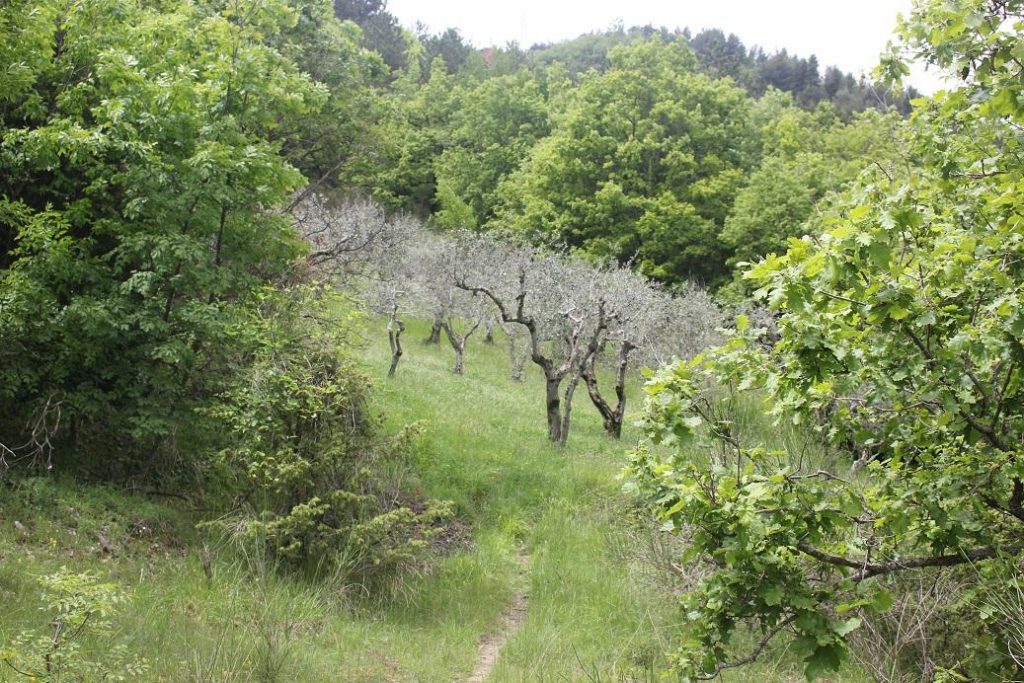
Magical olive grove on a mountain road somewhere in Umbria, 21st May 2019
Continuing this digressionary travelogue eight months after its events, I live it again from different angles and often in greater depth, unearthing all kinds of connections which I’m strangely glad we didn’t know at the time. They would have weighted us down: the dismay of realising what we had to miss. Obscure places appear to have no history, which can never be the case . . . but can be a relief.
The day we left Castel Madama, the weather was glum, and we struggled to find the exact route we’d planned – especially after the incredible gorge we reached the brink of via the SS79 at Terni. In conditions reminiscent of Tarkovsky’s Stalker[i], the industrial town spread through the crevasse below in a half-mist of rain or smog. Looking it up since, apart from the spectacle and shock of its location, emphasised by the weather perhaps, I can see we missed almost everything about it and the surrounding area. That it’s known as the City of Lovers thanks to St Valentine, born and eventually becoming a bishop there, seems quite anachronistic. More appropriate to our experience, I discovered that although the renewable energy manufacturing sector eluded us and we escaped ‘Area Polymer’, in our efforts to find the minor escape road northwards, we obviously became entangled in the ‘Stainless Steel Area’.
Of the Marmore waterfalls – whose spray we must have virtually driven through on our descent into the gorge – we saw and knew nothing. As in so much travelling, this is inevitable. Terni was a place we only had time to pass. To do justice to all the cities, towns and regions skimmed in our three and a half weeks, would take a year at least – always waiting for the right weather, hoping to discover something new. K had done months of research, looking up as much as possible in advance. Yet three-quarters of what is memorable, and all the people you encounter, have never been in any guidebook. While to know or expect too much, might diminish the vital sense – especially in less domesticated areas – of being off, the never very good, maps.
Providentially however, backtracking many times until recklessly taking a chance on an unlikely-looking, pot-holed ascent between five-storey apartments with an air of cul-de-sac, we found the correct escape from the ‘Stainless Steel Area’. Through the mountains this route climbed towards Acquapalombo – punctuated by traffic lights at narrow sections where precipitous rocks to the left were obviously dead keen to cover the tarmac.
Spinning on and back, we lost all sense of direction. Overall, we figured we must be heading north – or else Terni would have reappeared below. Miles into the mist and into a landscape that to the east, would have looked like something from a Western had the cloud desisted, we finally stopped for lunch. We hoped that Bob Mitchum would ride into view to share a glass of wine and point our direction. Behind us the mountains were thickly wooded, while in front, grooved sandstone formed bluffs ideal for shoot-outs and the thwang of ricochet. Bob never showed, but at least the liquefied marl forming an estuary across the lane, travelling from woods towards desert – a strange frontier between contrasting landscapes and atmospheres – was briefly illuminated by sun. And then a large blue butterfly appeared and landed between us. I’ve since learnt that blue butterflies can symbolise just about anything depending on where you live in the world[ii]. But rather than a vindictive spirit, this one fluttered away, joyfully it seemed, behind where we sat above our narrow crumbling route – almost a track now, with no traffic at all – to lead us to the secret orchard of olive trees pictured above.
Driving declining river-beds, eventually we found a better surface and continued always down, hoping we wouldn’t come to a halt in another remote farmstead or courtyard where no-one ever appeared to live. Emerging on the SR418 west of Madonna di Baiano, suddenly we were back in the late 20th Century. The road skimmed on, now in hot sun, and soon we passed the old loop off the main road to enter Baiano at the following turn. A quiet dusty subway controlled by traffic lights, dives under the railway to reach the majority of the village beyond.
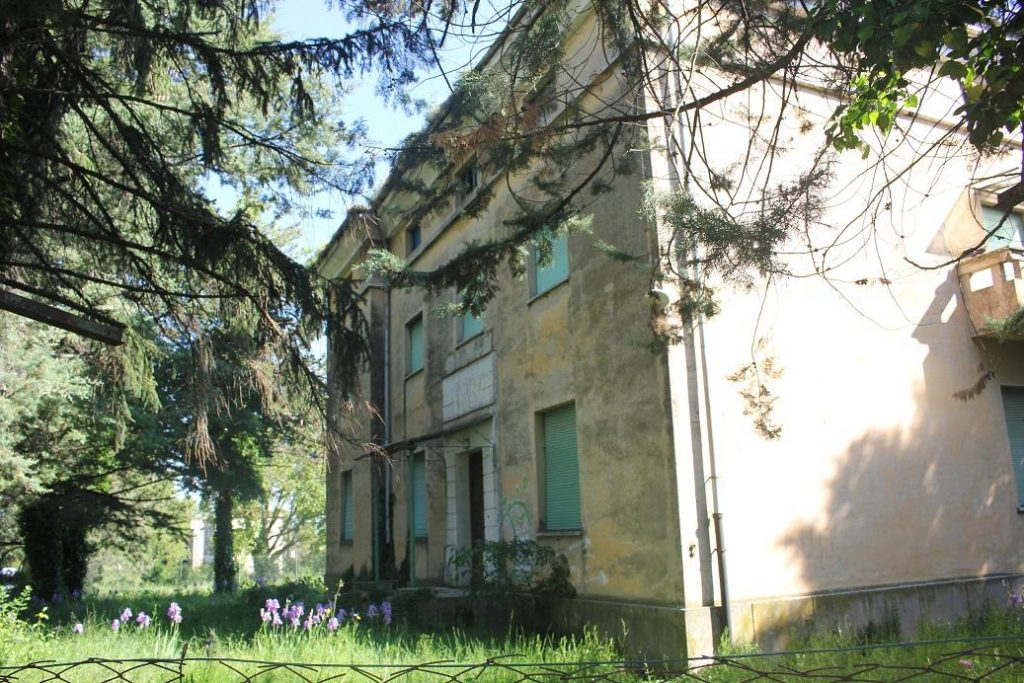
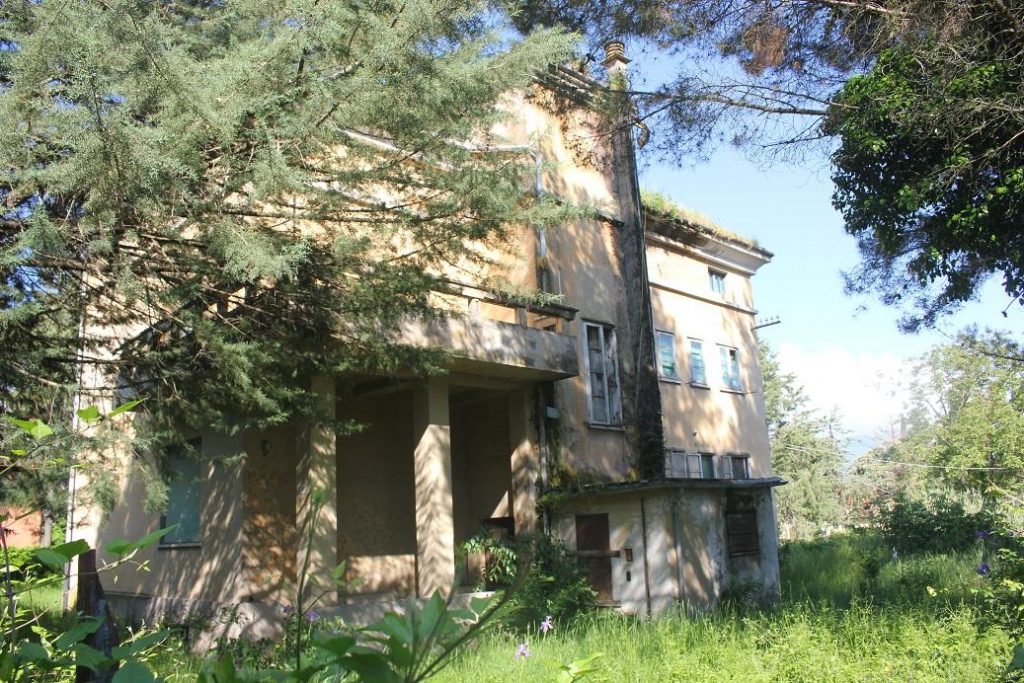
Semi-abandoned villas, Baiano, May 2019
Of places looked back on, Baiano despite its apparently normal, semi-suburban character, remains a haunting mystery. Though I will never forget our welcoming, ever cheerful and eccentric host Maurizio, something quite other, remains detached from that viewpoint. Alone or together, K, the children and I, meandered local lanes and visited the blankly disquieting railway station across the road – always apparently empty, despite its many stopping trains. Alone or together, we passed through the accretions of half-hearted and semi-abandoned architecture randomly orbiting the village, the shuttered villas and their shady patches of wilderness. On we would go, puzzled but fascinated, further out into the country. Even at the time – but more so in recollection – the whole area has become inhabited by the ghosts of two contrasting figures. Foremost, comes the determinedly wistful Grand Meaulnes[iii], forever wandering to find his lost domain, in the eternal glowing evening of the mind, somewhere to the east of the village:
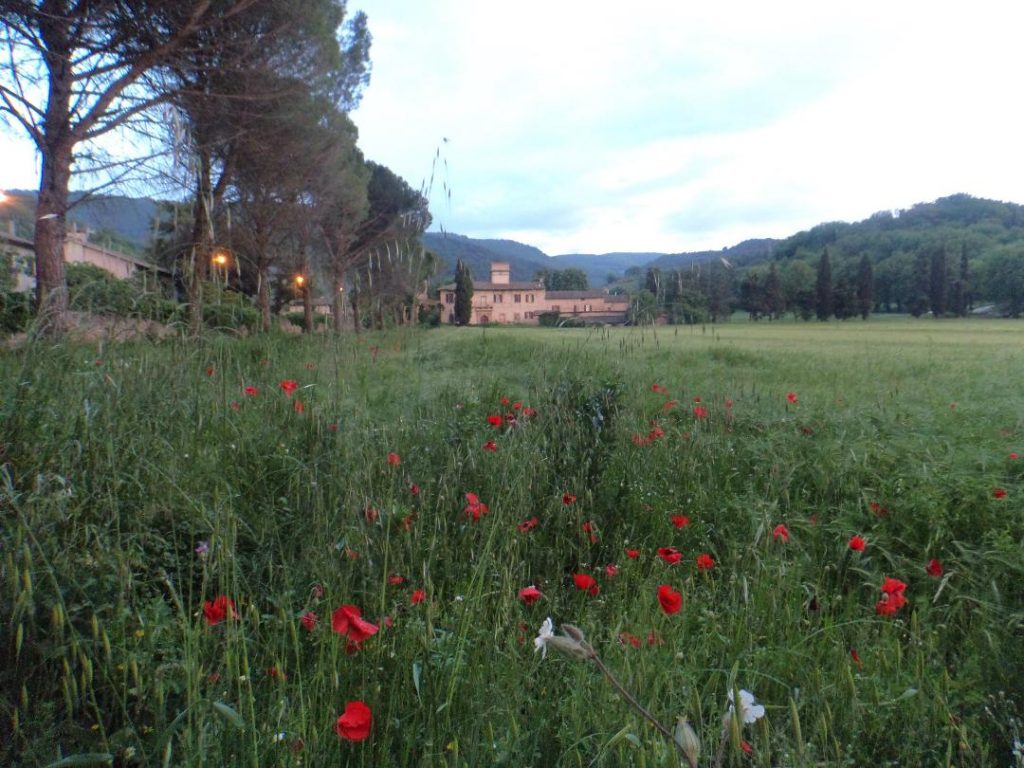
Secondly, comes the unlikely figure of stern Vladimir Lenin. Why name a country lane heading into enigmatic countryside, Lenin Street? Or rather VIA LENIN with the addition underneath: Artefice della Rivoluzione, Russa 1870-1924 – in case in the future we might forget who the pointy-bearded idealist-slipping-into-autocrat had been? Was the lane the first stage in a development that never developed? Or were a few street signs all some local communist council could afford to manufacture in homage?
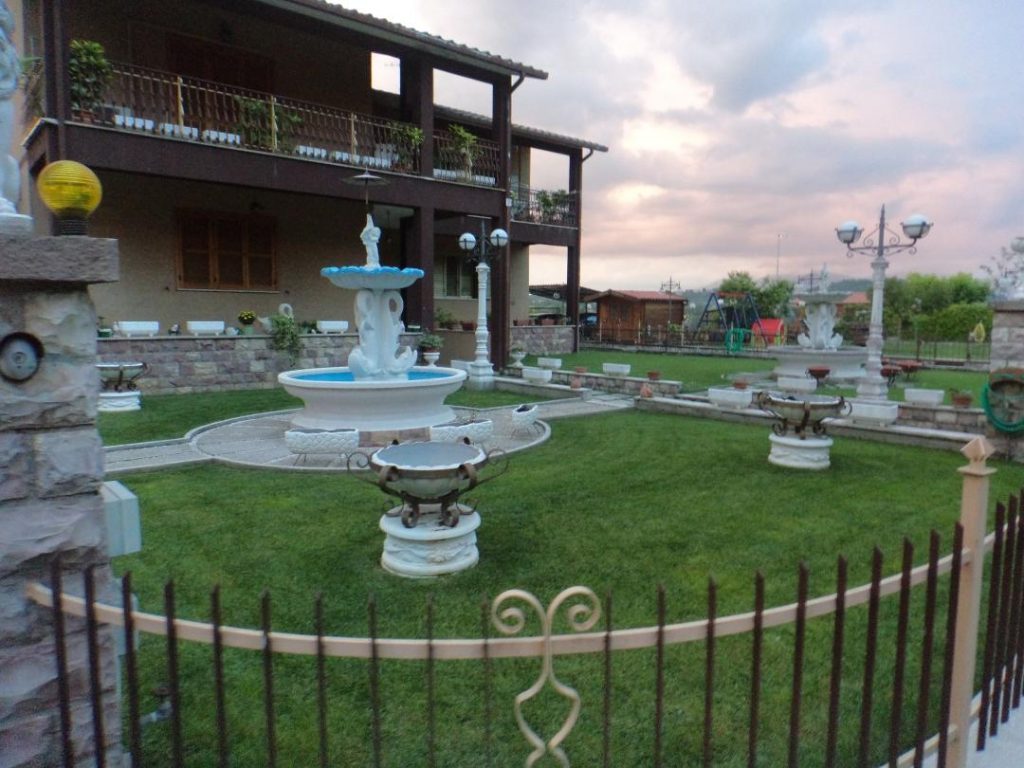
New-build kitsch in Via Lenin – Somehow, I doubt the revolutionary leader would have approved!
The oddest thing about mental travelling, is how much of the original experience, even days well notated, can remain elusive – until photos bring everything back, the whole train: wagons, coaches and junctions. But for each photo elected here, at least four candidates campaigned. Often the worse they are as photographs, the more they summon or suggest something hidden. So, do you select the ‘best’ shots (always fortunate and random in my case), those which could stand alone? Or do you choose those which seem to offer the most effective way into a mystery . . . yet may not work for anyone else?
Also, there are the bizarre shots – of political posters and signs, unusual vegetation, street furniture or extreme items of food. Most notable example of the last, was the loaf of bread two feet across purchased by K before we caught the train onward from Perugia: a loaf it appeared would require a chainsaw to penetrate its crust; a loaf I almost, literally, strained my wrists to break; the loaf that was still going strong a week later.
With what pleasure Maurizio showed us around his family’s house and garden at Madonna di Baiano. Built by his father-in-law, this is all above ground floor with the visitor’s apartment to one side and his mother-in-law on top. Underneath is a large garage area, useful to store the antiques and other “junk” (to use his words) from which he makes his living. The first things he presented to us when we arrived, were three beautiful facsimile prints of Old Spoleto – which miraculously survived being rolled and stored in a plastic bag tied to our rucksack for the next 11 Days. They did get crumpled, but once home, slightly dampened, were carefully ironed flat again. Such rare tasks are the only thing we ever use an iron for (if we can find it).
Maurizio had enlisted the help of teenager Lorenzo to advise us on places to visit, Lorenzo’s English being better than his own. Enacting their expert comedy double-act with easy rapport, we assumed Lorenzo was his son. In reality, obliging Lorenzo, was a friend of Maurizio’s son, and had only come over to play drums in the garage.
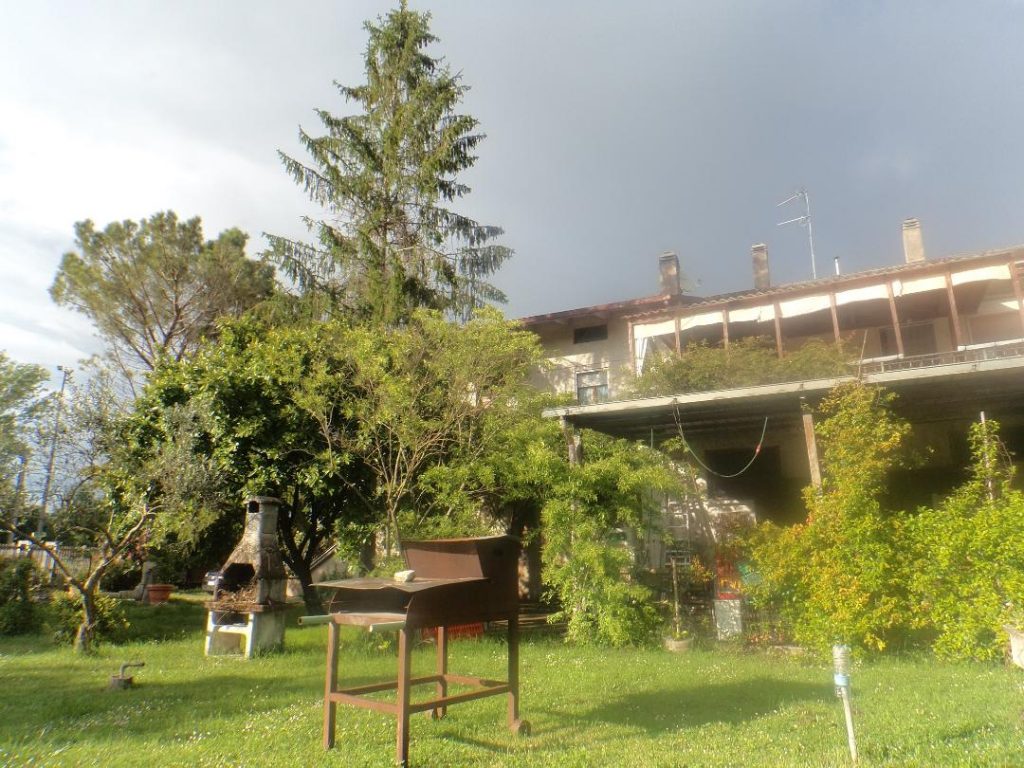
The following day on return from our day out, a burst of sun drew me down to the lush garden – soaked after another bout of thunderstorm. I was having a mug of tea (or maybe coffee, made in one of those ubiquitous Moka pots mentioned at the end of Part 2[iv]), when Maurizio returned from Spoleto and joined me. Before the next downpour we strolled around his garden trying with infinite good humour and almost no understanding, to converse. I pointed out a piece of interesting stone, wondering if it was an ancient section of Roman column. Grinning, Maurizio picked it up and threw it to me. “Teatro!” He grinned again. The section of column was very convincing polystyrene – more likely to blow away than do you an injury.
That moment has lodged in my head the way that another from 1985 always has. I was doing a part-time job – one of those dodgy, yet often inadvertently interesting schemes the Thatcher Government contracted out to various dubious bodies to massage or disguise the unemployment figures. The workers were a peculiar blend of the long-term jobless. Quite a few were graduates holding degrees in ‘useless’ subjects. Although nowadays such a description might cover the majority of graduates never likely to find a job in their field (or worthy of their efforts), at that time, maybe they were more of a rarity? One fellow worker had a degree in Palaeontology, another in architecture, while a third had a First in Marine Biology. Mixed with these were unsuccessful artists/weirdos like me, the mentally deficient, and a soupçon of ex-cons. Funniest of the latter was Russ. Russ had done time for GBH. He looked the part but never acted it. Hilariously bolshie toward the ‘team leaders’ and supervisors (universally treated with contempt), he maintained a considerate loyalty towards the rest of us.
Like a chain gang without the chains, one day, much to the approval of a passing member of the public walking their oversized dog, we were clearing an old footpath to the moor. Reining in her charge, the local resident whispered something to the team-leader, standing around (as usual) with the air of a guard. Nearby, a small tree had chosen to go orange earlier than its confederates. Russ moved across to it, tipping en route, an imaginary hat to the lady and her eager, pampered wolf. Standing under the tree’s lowest branch, he reached up and shook it. A few rustled leaves came drifting down. “AUTUMN!” he announced in a loud, monotone, vegetative voice – as though most of his brain had been removed. The dog woman almost clapped for joy and passed on.
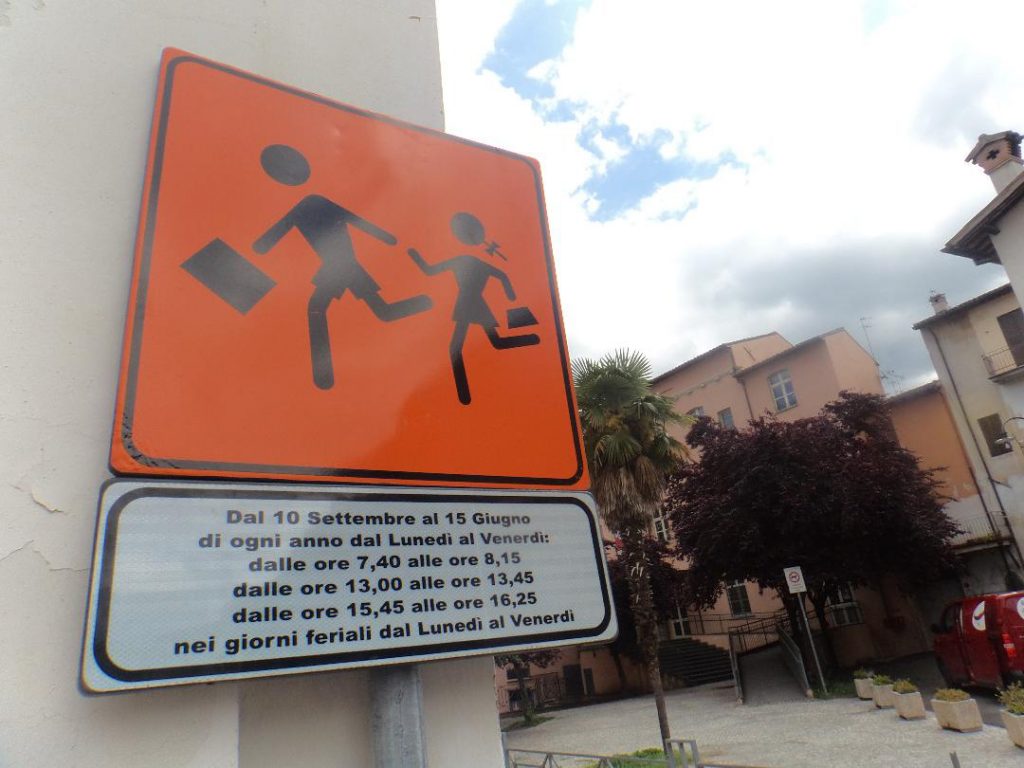
Beware of Children, Spoleto, 22nd May 2019
Worried about carting a shelf-load of books, for our Italian expedition we tried a miniature kindle[v] type device onto which K loaded all the free books available – including the complete works of Herman Melville. Moby Dick (unabridged), would no doubt form a solid enough foundation alone . . . but in the end, though I’d almost always be happy to read of their adventures again, neither Ishmael nor Ahab were needed. In fact, the way that all the usual domestic rituals broke down abroad, was pleasingly freeing. When they were observed, like the tea break in Maurizio’s garden, they seemed almost holy. I wondered, should the opportunity arise to ever move abroad – the Pyrenees, Italy, San Francisco the Azores and Crete[vi], have all appealed to me – how quickly I could forget the old life and rituals, the good things as well as the increasing slugs, damp and mould in the advent of accelerating climate change? Yet in times of change or stress, a bit of reading has always been a stabilising influence. Travelling through Italy, reading took the place of the short film I might have watched at home.
Although most of the unfamiliar books on our dwindled kindle thing were not very good, one remained intriguing and exasperating by turns: The Fallen Leaves, of 1879, by Wilkie Collins[vii]. Full of social ideals and criticisms that refuse to settle into the lurching, histrionic narrative, its mishmash of wish-fulfilments and fantasies, constantly strike new courses. Although not in the same league as Nathanial Hawthorne’s The Blithedale Romance[viii] of twenty-seven years earlier, in some ways, The Fallen Leaves could be read as a sequel – one that follows a boy from somewhere not unlike Blithedale farm, who decides as a young man to return to the old world of Europe. Chance meetings abound and before long, the hero of The Fallen Leaves, Amelius Goldenheart, giving a public lecture, appears at a stroke, to achieve London-wide fame. Surely even ancient Rome was too big a society for such instant intellectual celebrity or notoriety? Yet supposedly Byron awoke to find himself famous – and nowadays such visibility strikes all manner of largely worthless citizens, a few of whom steadfastly, inanely, refuse to go away.
Steeply tilted, the streets of Spoleto rise towards its high castle. Only on the way down did we discover the escalators to ease passage for pedestrians. Nearer the castle we found a lift, which K and the children were delighted to discover “pops out inside the castle”. Having a strong distrust of lifts[ix], I mounted the accompanying stairs. Even from the base of the castle, the views over the town into the distances of Umbria are outstanding. Following the walls around to the back we were gifted a fine prospect of the 13th Century Aqueduct – “possibly built over the ruins of a Roman structure”.
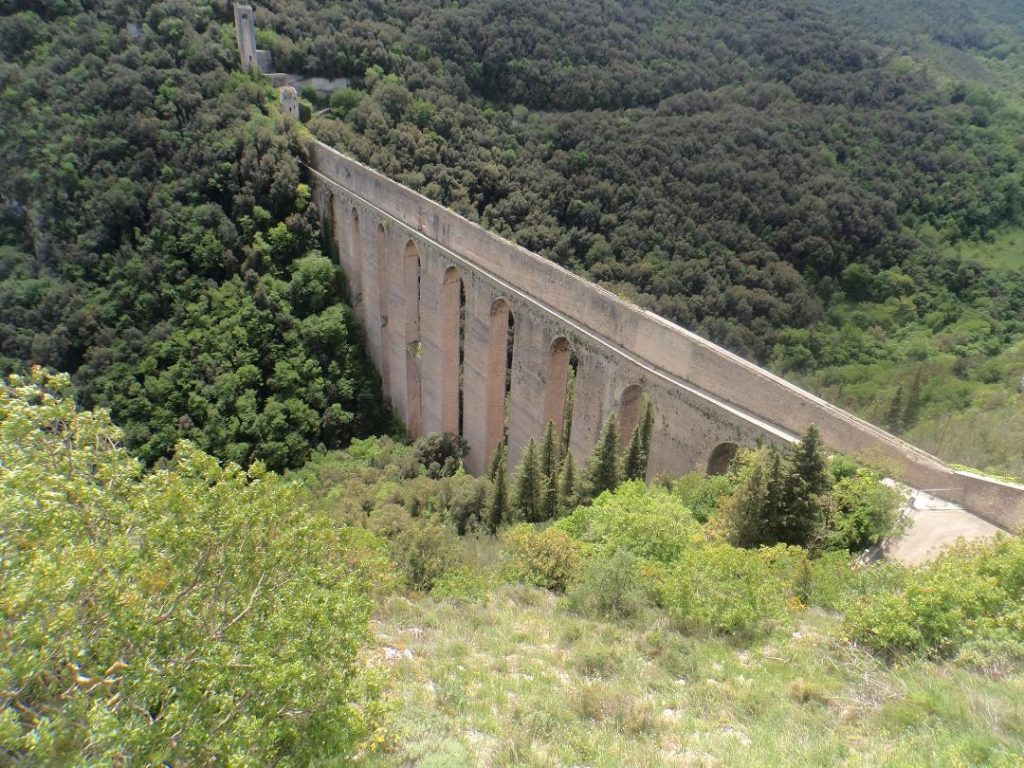
K’s plan had been to use the aqueduct’s footpath – visible in the photo above as a groove – to cross the gorge for a picnic on the opposite side. Unfortunately, recently damaged in an earthquake, the Ponte delle Torri was closed to the public. Despite K’s immense disappointment, in shade amongst flowers and brush, with a perfect view of the arches, we had our picnic anyway, unaware of the heavy rainstorm approaching.
Searching for an alternative way home to Baiano, we got interestingly lost in foothills to the south and ended up returning to Spoleto from another angle. As rain started to fall, still in a state of surprise, fate led us up the hairpins of a mountain road. The rain increased. Lined with bales wrapped in orange and white plastic (to prevent cyclists plunging into the gorge in a forthcoming race, Maurizio later informed us), we passed a gang laying new tarmac with an iron-age bulldozer. Lightning flashed and thunder boomed. The road became a river. Worried the force of water would wash us away, we took a gravelly refuge under a low cliff. Claustrophobia in the steamed-up car getting the better of me, I grabbed my coat and ran up the track nearby, never expecting to find an abandoned restaurant. On summer evenings, high above the town it must have been idyllic. Then another cloudburst struck, and I took shelter, knowing the coat wasn’t good enough to keep out such volumes of water.
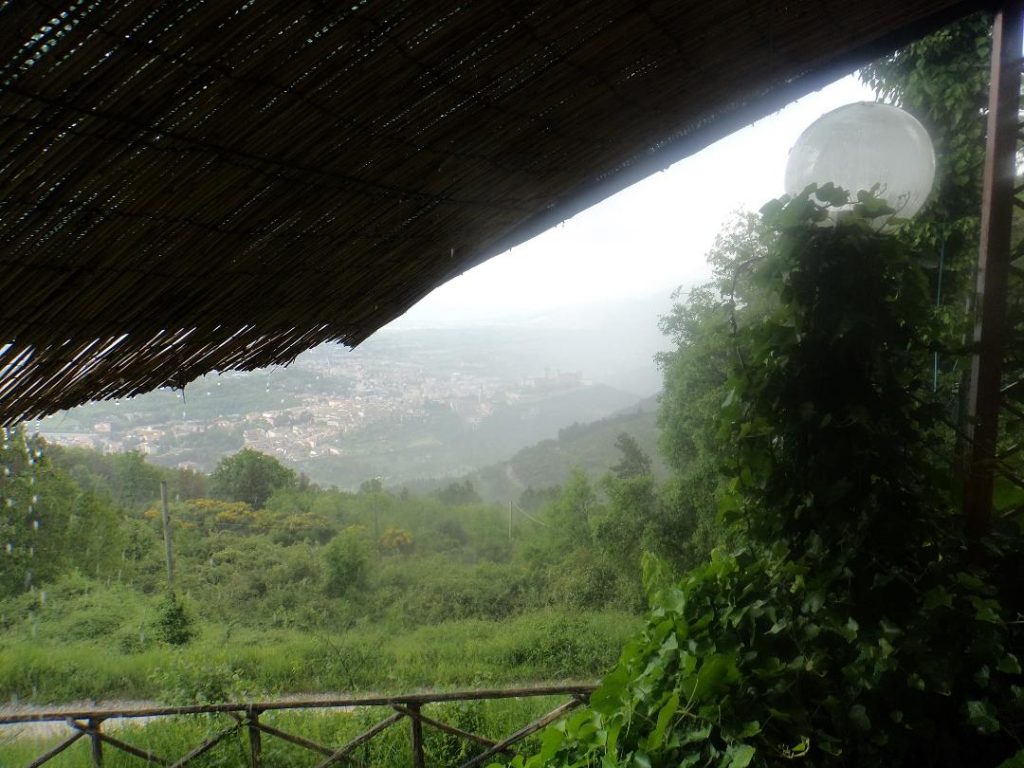
Abandoned restaurant above Spoleto, 22nd May 2019
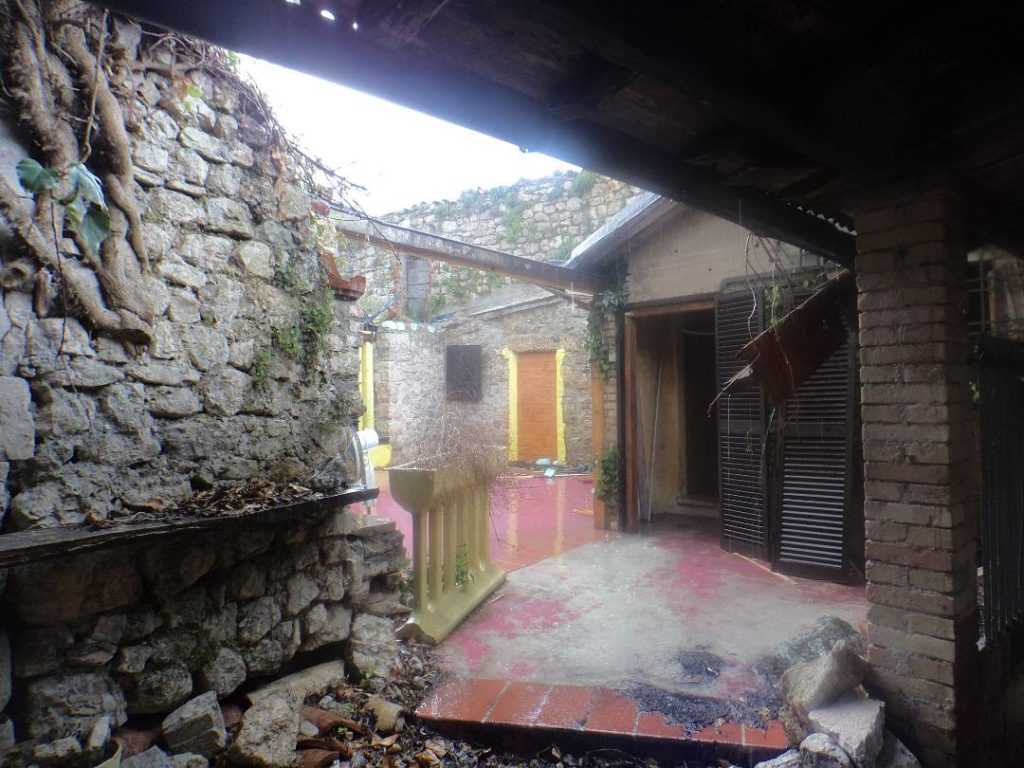
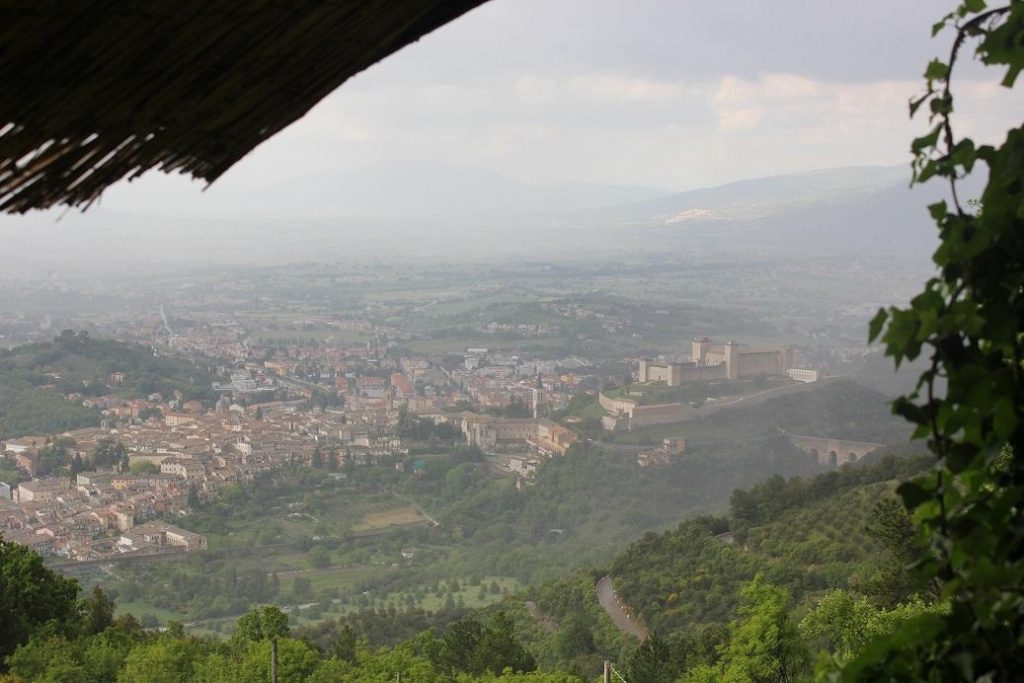
Eventually, the thunder and rain shifted away to the north east. Below us, the town and castle of Spoleto became visible again.
Lawrence Freiesleben, Italy and Cumbria, May-June 2019 and January 2020
NOTES
[i] https://en.wikipedia.org/wiki/Stalker_(1979_film) Along with the same director’s Solaris, Stalker has been in my list of top ten films since the mid-80s. Living in remote rural areas, my opportunities to visit cinemas have been extremely limited and though the best films should work on a smaller scale (down to a large TV – nothing of value is likely to work on a phone or tablet) I do hope that one day I will get a chance to see these exceptional works at their proper size. https://en.wikipedia.org/wiki/Andrei_Tarkovsky https://www.imdb.com/title/tt0069293/?ref_=fn_al_tt_1
[ii] https://www.butterflyinsight.com/blue-butterfly-color-meaning-and-myths.html
[iii] https://en.wikipedia.org/wiki/Le_Grand_Meaulnes
[iv] http://internationaltimes.it/the-italian-digression-part-2-treviso-to-lago-di-barrea/ and: https://en.wikipedia.org/wiki/Moka_pot
[v] As the 1940s associations of ‘austerity’ have faded, so kindle’s original meaning will perhaps be lost? Unless, before long, we are back in a kind of Stone Age where lighting fires becomes a common skill again. Yet the modern usage of ‘kindle’ is an appropriate one. Not so sure about the re-purposing of ‘austerity’.
[vi] Although the last three are pure fantasy – I’ve never actually been to any of those places.
[vii] https://www.wilkie-collins.info/books_fallen_leaves.htm
[viii] https://study.com/academy/lesson/the-blithedale-romance-summary-analysis-quiz.html
[ix] “I don’t like lifts, the way they shut me in / They make me sulky like Jesus in Pasolini / I could not forsake my life for him / I would rather take the stairs /4 floors or 44, it’s all the same / Or just not go there/” … and so on.
